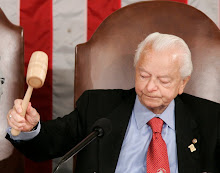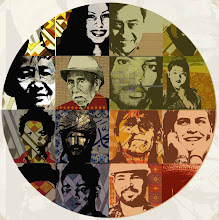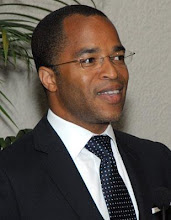Sunday, July 11, 2010
Africans Cheer for former Colonial Master in Cup
Thursday, July 8, 2010
The Fabric of Our Lives: The New-Age Political Quilt
In the wake of the passing of Sen. Robert Byrd (D-WV) American politics has hit another checkpoint on the racetrack of evolution in leadership. The longest serving US Senator had a storied career bringing thousands of projects to his state, holding almost every high-ranking Senate post and mentoring scores of upstart Senators. But the other side of the coin is less stellar -- Byrd was a kard karrying member of the Ku Klux Klan and an early opponent to the Civil Rights Movement.
During the Byrd memorial in Charleston, West Virginia President Barack Obama recalled some of the first words Byrd spoke to him.
"There are things I regretted in my youth, you may know that," Byrd said to Obama. The President said he responded that we all have had regrets.
President Bill Clinton spoke about Byrd too, painting the character of Byrd from how he helped now Secretary of State Hillary Clinton to aiding the "little man" in West Virginia. Yet, Clinton mentioned the KKK too.
"[Byrd] was trying to get elected," Clinton said, regarding his potential reason for joining the Klan. "He spent the rest of his life trying to make it up. We are all alike, that is the real education the Senator Byrd got."
While Byrd continued to make his mark in the Senate legislating for the Mountain State just a few 100 miles away, hailing from another Charleston was a South Carolina State Senator Tim Scott. Now Scott is the republican nominee for South Carolina’s first Congressional district, who just beat out long-time segregationist Strom Thurmond’s son the primary. That is a feat in itself, but Scott would also be only the fifth black republican US Congressman in American History. In his 20's Scott was mentored on the virtues of the Republican Party by a white man in South Carolina who was only a couple years his senior. Scott's mentor passed away before reaching 35 and that has inspired Scott to continue the dear friend’s message and work.
Scott has said he is also inspired to become a public servant like Strom Thurmond. That raises eyebrows even higher. A black politician that models himself after a proponent of "Separate but Equal," how does that fly? But like Byrd, Thurmond changed over time.
In Scott's lifetime (he is 44) Thurmond became better known, at least in South Carolina, for his outstanding level of constituent service. Scott has said he wants to be cut from that same cloth.
Personally, I know that Strom Thurmond was great with constituents. When my grandmother, Lillian Whack, was seeking nursing home care for her mother in Charleston she wrote to nearly every politician in South Carolina asking for help. The one-time segregationist was the only leader that responded. Thurmond helped coordinate an agreeable arrangement for my great grandmother's final years. South Carolina voters seem to have seen more of this side of Thurmond in Scott than they did in Thurmond's own son.
The fabric of America's politics is evolving -- in all political parties, in all races, among men, among women, all across the nation. From Byrd and Thurmond, to Scott and Nikki Haley (Indian-American GOP nominee for Governor of South Carolina) the quilt is being woven with swatches of red and blue. The difference is the fabric is starting to come from new manufacturers now more than ever.











